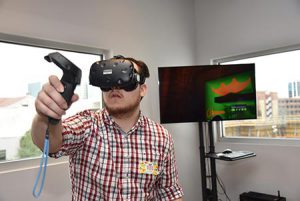
UCF’s Interactive Expeditions (INTX), a partnership between the university and Cobham Inc., recently returned from South Africa and Swaziland. While on the road between Johannesburg and Cape Town, the team led by Phil Peters produced real-time, interactive webcasts that connected over 100 undergraduate anthropology and philosophy students at UCF with two professors teaching live from Africa.
The group visited and broadcasted from the Nelson Mandela Residence in Soweto, a township of Johannesburg. Reverend Jesse Jackson happened to be visiting Soweto and participated in a brief interview. Among other activities, the drum team at the Nap Ford Community Charter School participated in a live drumming session in Cape Town. See video of children from the Nap Ford School engaging in a unique cultural exchange with the team in South Africa.
The expedition, which has been called a “Cultural Transect,” supplements two online classes taught by Bruce Janz and Rosalyn Howard. Both classes focus on the contemporary arts and culture of South Africa, and will allow students to experience contemporary African art by interviewing dancers, musicians, performers, and other artists who are actively defining what it means to be South African after apartheid. Dr. Howard’s class also focuses on the creative use of art to combat HIV AIDs in African communities. Using Interactive Expedition’s mobile satellite and webcasting technology, Janz and Howard spoke with their students in America in real time through two-way video conferencing.
Interactive Expeditions is a research partnership between The University of Central Florida and Cobham Inc., directed by Phil Peters. The purpose of INTX is to provide real-time, mobile, remote education solutions that connect learners at home with subject matter experts in the field. Past INTX research projects have included The Ethnobotany of Northern India; Bermuda Cave Diving; and Western film history from the deserts of Utah and Arizona. This year’s expedition was co-sponsored by the Center for Research and Education in Arts, Technology and Entertainment (CREATE).